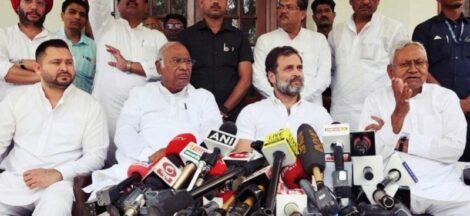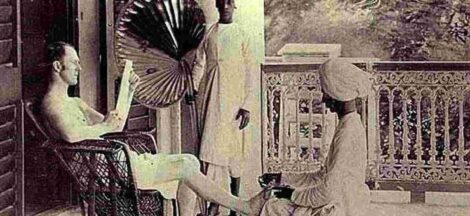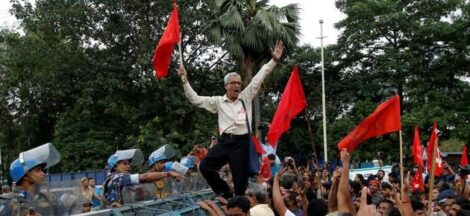By Sankar Ray
The proverb all’s well that ends well prevailed at Karachi’s Hakeem Saeed ground in Gulshan-e-Iqbal when at long last workers of the two parties, Tehreek-e-Insaf and Pakistan People’s Party, buried the hatchet on the eve of organising a jalsa on the 11th anniversary of Black Day on 12 May. Imran Khan’s party gave up the insistence on the celebration at the Hakeem Saeed ground and chose another venue. It is clear that the conflict between the two parties was over a petty issue.
On this day during the regime of Pervez Musharraf, nearly 50 people were killed, with hundreds injured due to a sanguinary riot between the political activists of Musharraf-backed Muttahida Qaumi Movement on the one side and on the other side were those of PPP, Awami National Party, and Pakistan Muslim League-Nawaz when the three Musharraf opponents embarked on a protest mode demanding the return of Chief Justice of Pakistan Iftikhar Chaudhry. The upright Quetta-born CJP Chaudhry had built a reputation around himself for direct confrontation with the civilian government and the powerful military establishment. Every year, this day is observed as a black day in the country as an expression against oppression and violence. Justice Chaudhry is the longest serving CJP in the history of Pakistan, heading the judiciary for six years – June 2005 to 9 March 2007, although remained dysfunctional in November 2007 – a “non-functional Chief Justice”.
PTI, which had no presence in the protest action against President Musharraf’s trampling down of judicial independence under the feet, claimed its right to hold the jalsa at the same place on 12 May and pressed its workers to chant slogans in an aggressive manner. They clashed with their PPP counterparts. Workers of both the parties were playing their party songs on loudspeakers. The situation obviously turned violent as workers began hurling stones at one another and setting vehicles on fire. Political analysts made no mistake in seeing in the strategy of PTI a motive to wrest control of the MQM-P’s support base. PPP had the same objective as it is gradually becoming a Sind-based regional party for its opportunistic politics under the garb of so-called ‘politics of reconciliation’ that cost it dearly in the 2013 general elections. This stance is directly opposite to the pro-Left character, built during the leadership of Benazir Bhutto.
However, the Hakeem Saeed ground became very tense for a couple of hours that compelled the police to intervene as the resulting chaos spilled over on to the main University Road and made the traffic screech to a two-hour halt . The PTI and the PPP leaders too rushed towards the spot that was at a flashpoint. PTI chairman Imran Khan demanded that the Sindh government under PPP take action against those involved and said, “Strong arm tactics by PPP reflects their fear of PTI’s rising popularity in Sindh.” His counterpart in PPP Bilawal Bhutto Zardari tweeted, “PPP‘s 14 innocent unarmed workers were martyred struggling for the restoration of judiciary. To pay tribute to our martyrs PPP planned to hold a jalsa at Hakeem Saeed ground in District East, as most lives were lost in District East. We applied for and received all necessary legal permissions. To attack us in such a way on this tragic day is a sad commentary on the fascist tendencies of PTI”
The rightwing religious parties were effectively trying to cash in on the PTI-PPP clashes. Two debutant religious-political organisations, the Tehreek-e-Labbaik Ya Rasool Allah (TLY) and the Milli Muslim League, which is the political front of Jamaat-ud-Dawa, sprang a few surprises with an unexpected 14 per cent of votes in the by-poll for National Assembly seat -NA-120. The TLYR and MML got 7,130 and 5,822 ballots respectively, ending up as distant third and fourth but the secular-liberal PPP got only 1, 414 votes. This is a wake-up call for PML-N, PTI and PPP with less than a year left to the parliamentary elections. Ahsan Iqbal, the interior minister, who escaped an assassination bid, albeit wounded, was attacked by a would-be assassin belonging to TLYR, one of the myriad extremist organisations that sprouted up in the venomous milieu, created by the ‘Miltablishment’ dictator, General Zia ul Haq. The imperative is to deconstruct the distinctive performance of the two new religious-political parties that are an omen for the democracy in Pakistan.
Ever since the end of protracted martial law and return of democracy – although the military establishment breathing down the neck of the brass of major political parties – religious-political parties have never performed well at all in Pakistan’s electoral politics and never been voted to power at the national level. At the most they were junior partners in coalition governments. At worst, they have remained political-pressure groups to use their street power to protect their religious interests.
But the PPP’s power base in Punjab has been eroded due to PTI’s intrusion. Nonetheless, Imran Khan has no reason for conceit as the votes bagged by the TLY and MML constitute the right-wing vote bank that usually had a pro- PML-N tilt. Moreover, shrinking of the PML-N’s power base in Punjab is a reality.
Right now leaders and cadres of all the parties, including ANP, are in a mood to observe the black day. (IPA Service)
The post PPP, PTI Adopt Tactical Truce To Remember Black Day appeared first on Newspack by India Press Agency.


